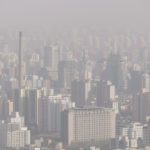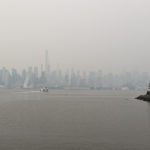New Oxfordshire-wide air quality website launches
A new Oxfordshire air quality website launched on 18 September, offering air quality guidance and resources covering the county.
The website (www.oxonair.uk) aims to integrate...
‘Lab-on-a-drone’ tested at wastewater treatment plant
A “lab-on-a-drone” system has been used to monitor hydrogen sulphide gas from the air above a wastewater treatment plant in Brazil, in a project...
Low cost sensors can pinpoint pollution
Sources of air pollution on construction sites or quarries could be cheaply and easily located, using low-cost sensors and a new methodology, according to...
Clean Air Zone reduces NO2 levels in Birmingham, confirms study
Birmingham’s clean air zone (CAZ) has reduced the levels of nitrogen dioxide gas (NO2), according to a new study.
Scientists used an innovative technique to...
Sponsored content: Simple industrial pollution monitoring with AQMesh
AQMesh is being used for industrial air pollution monitoring around the world because it brings together a range of features and services that have...
A tale of two indices
A developer of air quality monitoring technology has voiced concern that air quality data can be displayed in a number of different formats, which...
State of the nation
This summer, NASA and its partners were deploying several new tools to observe air quality and pollution from the street to the stratosphere. ...
Sponsored content: Leading the way on clean air
Anua Clean Air UK writes: Anua Clean Air UK is a specialist air pollution control company with expertise in the field of biological treatment...
A new project aims to advance understanding of bioaerosol exposure and associated health impacts....
A new project aims to advance understanding of bioaerosol exposure and associated health impacts.
Supported by UKRI AI for Health funding, environmental scientists will bring...
From the ocean to the air
Microplastics are present in the marine atmosphere even in remote parts of the world. These tiny particles come from land sources but are also...
Sponsored content: Poor air quality – not just an occupational hazard
Air Spectrum Environmental writes: At Air Spectrum Environmental, we have prioritised the improvement of air quality in the industrial environment. We know how...
Sponsored content: Monitor air quality – without a monitor!
Being able to monitor air quality without a sensor in place seems like magic, although highly impressive, it's not quite magic. Advancements in technology...
Carpet cleaning conundrum
In rooms where smoking has taken place regularly, tobacco's imprint lingers on indoor surfaces, even long after regular smoking has stopped, according to new...
Hats off to filtering headwear
A Scottish company is seeking second round funding for what it says “could be a breakthrough in wearable technology” and a potential solution to...
Technology firm urges everyone to participate in Clean Air Day 2023
Technology firm Airly says it is lobbying government to address the ‘largest environmental health risk’
Serving as a reminder that air pollution causes up to 36,000 deaths every...
Wildfire pollution updates: Maps give shape to spreading toxic cloud
Smoke from Canadian wildfires was still affecting many areas of the Eastern US on Friday 9 June (as indicated by the many red areas...
Things to consider when choosing an air purifier
Air purification expert Blueair writes
Feeling sniffly and getting dry eyes recently? You may be experiencing hay fever symptoms. While many of us associate hay...
The quest for cleaner air
Instrumentation expert Thermo Fisher Scientific summarises the problem and its history, with discussion of the latest generation of measurement systems and their potential impact.
The...
DEFRA Air Quality Strategy: Health, environment and transport groups urge Government to re-think
Dozens of health, environment and transport businesses and charities are calling for the government to change course on its Air Quality Strategy. This comes...
Firms operating own boiler urged to register with SEPA for MPCD
Businesses operating their own boiler, engine or generator for heat or power urged to check if they must register with SEPA
Businesses that have been...






















